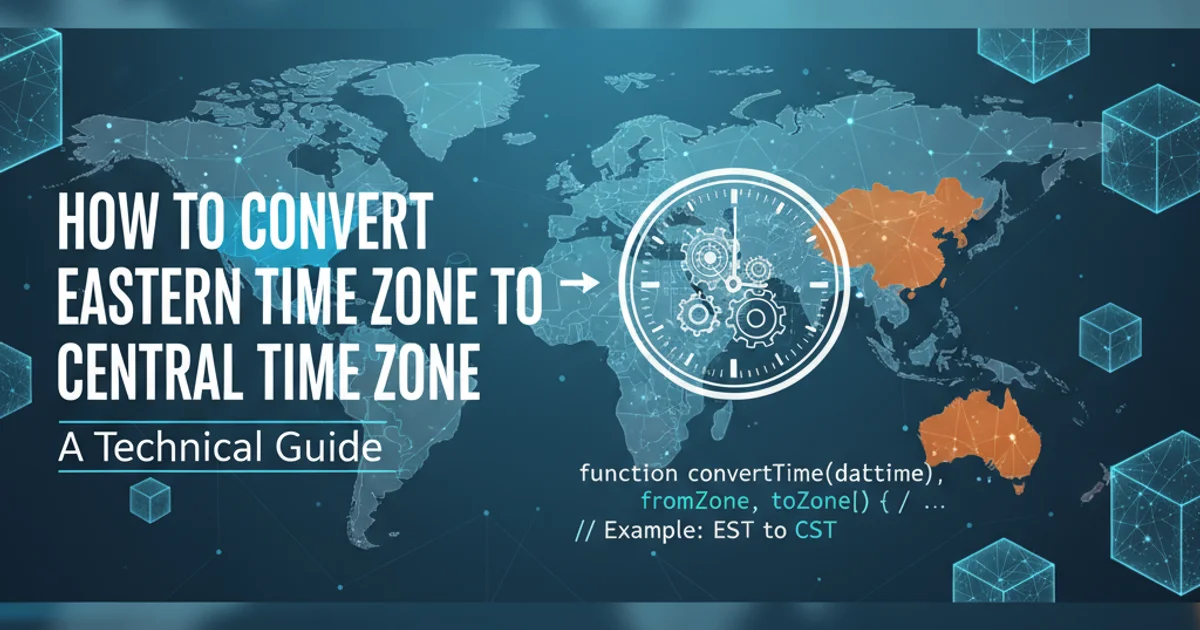How to convert Eastern Time Zone to CENTRAL TIME ZONE
Categories:
Converting Eastern Time Zone to Central Time Zone in PHP

Learn how to accurately convert timestamps from Eastern Time (ET) to Central Time (CT) using PHP's DateTime objects, ensuring correct handling of daylight saving time.
Working with time zones is a common challenge in web development, especially when dealing with users or data across different geographical regions. This article focuses on a specific, yet frequently encountered, scenario: converting a timestamp from the Eastern Time Zone (ET) to the Central Time Zone (CT) using PHP. We'll explore the robust DateTime and DateTimeZone classes in PHP to perform these conversions reliably, taking into account crucial factors like Daylight Saving Time (DST).
Understanding Time Zones and PHP's DateTime Objects
PHP provides powerful built-in classes for handling dates and times, making time zone conversions straightforward when used correctly. The DateTime class represents a date and time, while DateTimeZone represents a time zone. The key to accurate conversion lies in correctly setting the initial time zone of your source timestamp and then applying the target time zone.
flowchart TD
A[Start with Eastern Time (ET) Timestamp] --> B{Create DateTime Object with ET Zone}
B --> C{Set Target Time Zone to Central (CT)}
C --> D[Convert DateTime Object to CT Zone]
D --> E[Format Output as Desired]
E --> F[End]Process flow for converting Eastern Time to Central Time
Step-by-Step Conversion Process
To convert a timestamp from Eastern Time to Central Time, you'll typically follow these steps:
- Define the Eastern Time Zone: Specify the source time zone, which is 'America/New_York' for Eastern Time.
- Create a DateTime object: Instantiate a
DateTimeobject with your Eastern Time timestamp and the defined Eastern Time Zone. - Define the Central Time Zone: Specify the target time zone, which is 'America/Chicago' for Central Time.
- Set the new time zone: Use the
setTimezone()method on yourDateTimeobject to convert it to the Central Time Zone. - Format the output: Display the converted time in your desired format.
<?php
// 1. Define the Eastern Time Zone
$easternTimeZone = new DateTimeZone('America/New_York');
// Example Eastern Time string (e.g., from a database or user input)
$easternTimeString = '2023-10-27 15:30:00'; // 3:30 PM ET
// 2. Create a DateTime object with the Eastern Time Zone
$dateTimeInEastern = new DateTime($easternTimeString, $easternTimeZone);
echo "Original Eastern Time: " . $dateTimeInEastern->format('Y-m-d H:i:s T') . "\n";
// 3. Define the Central Time Zone
$centralTimeZone = new DateTimeZone('America/Chicago');
// 4. Set the new time zone to Central Time
$dateTimeInCentral = $dateTimeInEastern->setTimezone($centralTimeZone);
// 5. Format the output
echo "Converted Central Time: " . $dateTimeInCentral->format('Y-m-d H:i:s T') . "\n";
// Example with Daylight Saving Time transition (March 12, 2023, 2 AM ET -> 1 AM CT)
$dstEasternTimeString = '2023-03-12 02:30:00'; // 2:30 AM ET (after DST shift)
$dateTimeInEasternDst = new DateTime($dstEasternTimeString, $easternTimeZone);
echo "\nOriginal Eastern Time (DST): " . $dateTimeInEasternDst->format('Y-m-d H:i:s T') . "\n";
$dateTimeInCentralDst = $dateTimeInEasternDst->setTimezone($centralTimeZone);
echo "Converted Central Time (DST): " . $dateTimeInCentralDst->format('Y-m-d H:i:s T') . "\n";
?>
PHP code to convert a timestamp from Eastern Time to Central Time, including a DST example.
DateTimeZone identifiers (e.g., 'America/New_York', 'America/Chicago') for reliable time zone handling. Avoid using abbreviations like 'EST' or 'CST' as they can be ambiguous and don't account for Daylight Saving Time.Handling Unix Timestamps
If you are working with Unix timestamps (which are inherently UTC), the process is slightly different. You first create a DateTime object from the Unix timestamp, then set its time zone to the source time zone (if it represents a time in a specific zone), and finally convert it to the target time zone. However, if the Unix timestamp is truly UTC, you can directly set the target time zone.
<?php
// Unix timestamp (e.g., from time() function or database)
$unixTimestamp = 1677697800; // Represents 2023-03-01 10:30:00 UTC
// Create DateTime object from Unix timestamp (defaults to UTC)
$dateTimeFromUnix = new DateTime('@' . $unixTimestamp);
echo "Original Unix Timestamp (UTC): " . $dateTimeFromUnix->format('Y-m-d H:i:s T') . "\n";
// Define target Central Time Zone
$centralTimeZone = new DateTimeZone('America/Chicago');
// Convert to Central Time Zone
$dateTimeInCentralFromUnix = $dateTimeFromUnix->setTimezone($centralTimeZone);
echo "Converted Central Time from Unix: " . $dateTimeInCentralFromUnix->format('Y-m-d H:i:s T') . "\n";
// If the Unix timestamp was originally derived from an Eastern Time,
// you would first set its timezone to Eastern before converting to Central.
// This is crucial if the timestamp was generated from a local time without explicit UTC conversion.
$easternTimeZone = new DateTimeZone('America/New_York');
$easternTime = new DateTime('2023-10-27 15:30:00', $easternTimeZone);
$unixFromEastern = $easternTime->getTimestamp();
$dateTimeFromUnixEasternOrigin = new DateTime('@' . $unixFromEastern);
$dateTimeFromUnixEasternOrigin->setTimezone($easternTimeZone); // Treat as if it originated from ET
echo "\nUnix from ET (original ET): " . $dateTimeFromUnixEasternOrigin->format('Y-m-d H:i:s T') . "\n";
$dateTimeInCentralFromUnixEasternOrigin = $dateTimeFromUnixEasternOrigin->setTimezone($centralTimeZone);
echo "Converted Central Time from Unix (ET origin): " . $dateTimeInCentralFromUnixEasternOrigin->format('Y-m-d H:i:s T') . "\n";
?>
Converting a Unix timestamp to Central Time, considering its origin.